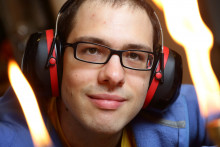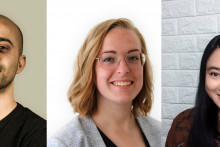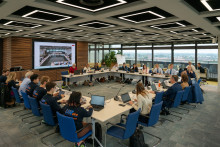‘Sometimes there is an explosion, that’s why our laboratory is separated from the rest of the building. But usually nothing happens.’ How comforting. Juan Roman Casado shows me his research domain, and that of his colleagues. He points at a rectangular steel device with a small window at the bottom. ‘This is where I do my experiments. I test the relationship between flames and sound in order to find the right proportions of air and fuel, to optimize the development of cleaner gas turbines.’
To a layperson such as your reporter, the importance of studying the effect of flames and sound may seem strange: what is the relevance? Juan explains: ‘Usage of modern lean combustion technologies and novel fuels causes more sound that traditional burning concepts. This noise creates vibrations, which in turn influences the reliability of the turbine. Material fatigue may occur and in a worst case scenario, this can destroy huge gas turbines worth hundreds of millions of Euro’s in a matter of only minutes.’
European project
Juan’s study is one part of an integrated European research on dynamics in cleaner gas turbine combustors. It includes no less than 5 European universities, 1 American university, 2 research institutes and 5 industrial companies. Imperial College and Siemens, to name a few. The large consortium resulted in some challenges for Juan, who designed the test-set up: ‘I designed 6 variants for different locations and different PhD researches. In the design process, I needed to adapt the characteristics for every location.’ In general, however, Juan is enthusiastic about the set-up: ‘The multidisciplinary approach is extremely valuable to produce data on many things at the same time.’ The group meets twice per year to exchange information and follow workshops.’
So the eventual aim is to create cleaner gas turbines. To what extent is this at odds with the emergence of fully sustainable energy? Will cleaner gas turbines not be overtaken by other technologies? Juan hardly thinks so: ‘Today’s pressure will lead to a future where wind and solar energy will be the most important energy sources. However, gas turbines will still be there 100 years from now. For example, gas and steam turbines combined can realize huge efficiency for large factories that require heat in their production processes. They can use that to supply their own energy. Furthermore, we will still need them to balance fluctuations in demand. On top of that, there is always the aviation industry, where safety comes first and emission comes second.’
The pieces fall into place
Working with energy all day long, Juan finds his own energy in climbing. ‘At first it seems very hard to find the right way up. But there is always a point where everything falls into place and the road is easily spread out in front of you. I believe this is also the case when I try to solve problems in my work, and in life in general.’ Juan discovered climbing after his arrival from Spain into the Netherlands, when he soon joined the climbing association TSAC.
Climbing is not the only way how he managed to become a socially involved person in the Twente community. Juan is one of the oldest P-NUT board members, holding the current position of treasurer. Juan: ‘I have seen P-NUT grow from an informal association of 7 persons to the moment where the rector asked us to go professional, now being 150+ member association. Being part of P-NUT is an excellent opportunity to meet awesome people who want to make a difference.’
Juan will finish his research this month and is eager to see how the pieces will fall into place for him afterwards. He smiles: ‘I am not afraid of the future.’







